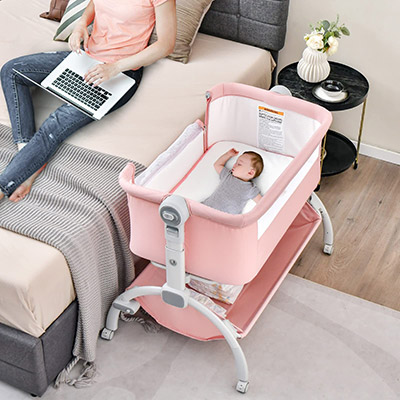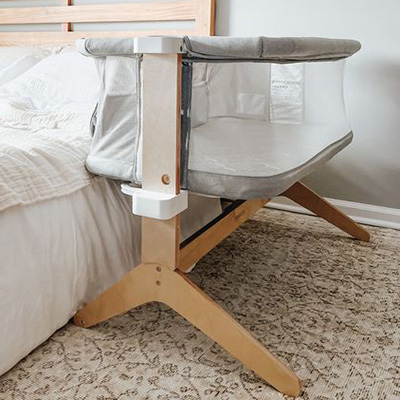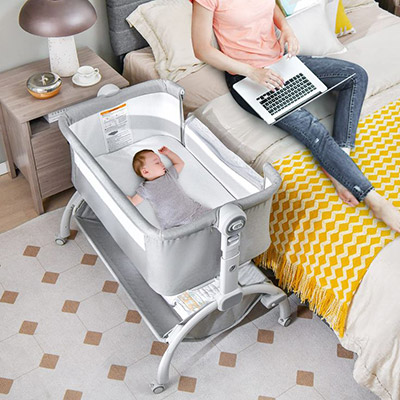When it comes to preparing for the arrival of a newborn, there's no shortage of decisions to be made. One question that often arises is whether a baby bassinet is necessary. In this comprehensive guide, we will delve into the essential benefits of baby bassinets and why they are indeed a crucial addition to any nursery. We understand the importance of a safe and comfortable sleep environment for infants. Let's explore why a newborn bassinet is not just a luxury but a necessity.

source: Pinterest
Reducing the Risk of Sudden Infant Death Syndrome (SIDS)
One of the primary reasons baby bassinets are necessary is because they provide a secure and cozy sleeping space for newborns. The American Academy of Pediatrics (AAP) recommends that infants sleep in the same room as their parents but in a separate sleep space for at least the first six months to reduce the risk of Sudden Infant Death Syndrome (SIDS). Bassinets are designed to meet these safety guidelines, ensuring your baby sleeps soundly and safely.
Proper Ventilation and Airflow
Quality infant bassinets are designed with breathable materials and proper ventilation to maintain a comfortable temperature and ensure a constant flow of fresh air. This helps prevent overheating and enhances your baby's sleep quality.
Easy Monitoring of Your Baby
Bassinets often come with mesh sides or clear panels that allow parents to keep a close eye on their little one without disrupting their sleep. This visual proximity provides peace of mind, especially during the first few months.
Nighttime Feedings Made Easier
For breastfeeding mothers or parents who want easy access during nighttime feedings, an infant bassinet placed beside the bed is incredibly convenient. It eliminates the need to walk to another room, promoting a smoother feeding process and faster return to sleep.
Easy Transportation
Many baby bassinets are designed with portability in mind. They often feature wheels or lightweight frames, making it simple to move your baby from room to room as needed.
Proximity to Parents
Having your baby sleep in a bassinet in your room for the first few months fosters a stronger parent-child bond. The proximity allows you to respond quickly to your baby's needs, which can be especially reassuring for both parent and child.
Travel-Friendly Design
Most bassinets are designed to be easily disassembled or folded for travel. This ensures that your baby has a familiar and safe sleep environment, whether you're visiting family or staying in a hotel.
Multi-Functional Use
Some infant bassinets come with additional features, such as built-in changing tables or storage compartments, maximizing their functionality and convenience.
Compact Storage
When not in use, many bassinets can be folded or disassembled for compact storage, making them an excellent choice for families with limited space.
Encouraging Self-Soothing
The cozy and secure environment provided by a bassinet can help babies develop self-soothing skills, promoting better sleep habits as they grow.
Establishing Sleep Routines
Having a designated sleep space in an infant bassinet can help establish healthy sleep routines from an early age, making the transition to a crib easier when the time comes.

source: Pinterest
Now that we've discussed the merits of a bassinet, let's briefly compare it to a crib. While both serve as safe sleeping spaces for babies, bassinets are ideal for the first few months of your baby's life. They take up less space, making them perfect for smaller bedrooms, and they offer the proximity that aids in nighttime care. Cribs, on the other hand, become more suitable as your baby grows and becomes more mobile.
If you want to know more about baby cradle, crib, and bassinet, please read this article in detail: https://www.craftchildren.com/blog/crib-vs-cradle-vs-bassinet-meaning-differences-features-benefits_b20

source: Pinterest
Selecting the right bassinet for your baby is crucial. Here are some factors to consider:
Safety Standards: Ensure that the bassinet meets safety standards and has appropriate certifications.
Size and Portability: Choose a bassinet that fits comfortably in your bedroom and can be moved easily.
Material: Opt for a bassinet made from non-toxic materials to ensure your baby's health.
Comfort Features: Look for bassinets with features like adjustable height, soothing vibrations, and music to enhance your baby's comfort.
Durability: Invest in a bassinet that will last through the early months of your baby's life.
Budget: Determine your budget and look for bassinets that meet your safety and functionality requirements within that budget.
Weight Limit: Check the manufacturer's weight limit recommendations to ensure the bassinet can safely accommodate your baby's weight.
Storage: Some bassinets come with storage features like pockets or shelves for baby essentials like diapers, wipes, or pacifiers.
Breathability: Look for a bassinet with breathable sides to prevent suffocation risks. Mesh sides are a good option, as they allow for air circulation.
Portability: If you plan to move the bassinet from room to room or take it on trips, choose a portable and lightweight option with sturdy handles or wheels.
In conclusion, a bassinet is indeed necessary for your newborn. Its safety features, proximity to parents, and versatility make it an invaluable addition to your baby's early days. When choosing a bassinet, prioritize safety, size, and comfort features to ensure the best experience for both you and your baby.
1. Can I Use a Bassinet Instead of a Crib?
Yes, you can use a bassinet as your baby's primary sleeping space for the first few months. However, it's essential to transition to a crib once your baby outgrows the bassinet or begins to roll over.
2. When Should I Transition My Baby to a Crib?
Most babies will outgrow their bassinet by four to six months or when they start rolling over. It's time to transition to a crib when your baby shows signs of being cramped or uncomfortable.
3. Do all bassinets come with wheels for easy mobility?
No, not all newborn bassinets have wheels. You can find both stationary and mobile bassinets, so choose one that suits your needs.
4. Are Bassinets Easy to Clean?
Bassinets with removable, machine-washable bedding are relatively easy to clean. Regularly wash the bedding and wipe down the frame to maintain cleanliness.